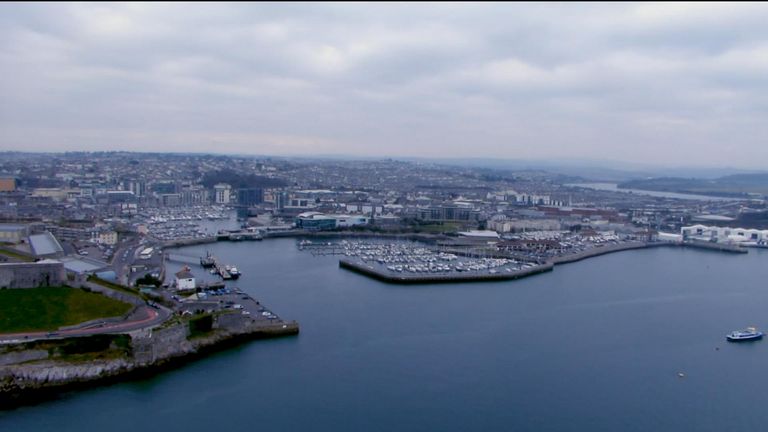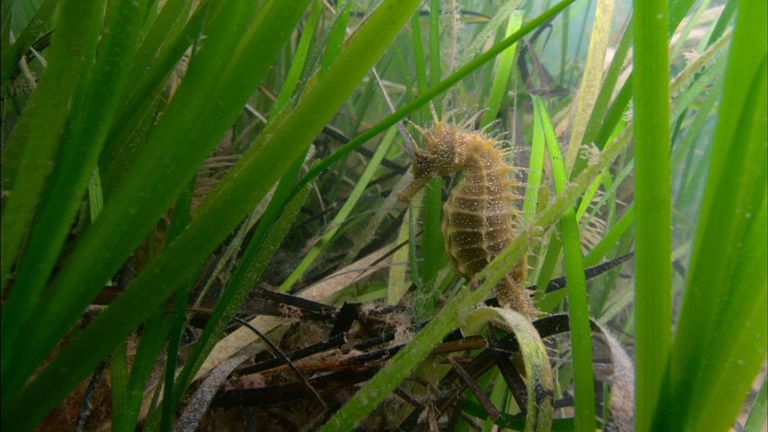UK's first marine park in Plymouth 'to lead way in ocean innovation'
Plymouth Sound is home to hundreds of species of fish and marine life, and campaigners want to protect the vast stretch of water.
Saturday 14 September 2019 08:23, UK
Plymouth Sound is set to be designated the UK's first national marine park, with the aim of protecting the area's estimated 1,000 species of marine life and vast seafaring economy.
Similar to a regular national park, the site at Plymouth Sound will be a protected area of the ocean.
City leaders, experts in the marine sector and partners from the public, private and voluntary sectors signed a pledge on Friday evening, demonstrating their support for making the UK's first national marine park happen.
The leader of Plymouth City Council, Tudor Evans OBE, said: "Plymouth, with its historic waterfront, rich maritime heritage, cutting edge marine research and its diversity of sea life is ideally placed to lead the way to create something of significant value locally that can be used to lead the way nationally."
Plymouth Sound is already a protected habitat for more than 1,000 species of fish and other marine animal life.
The park will aim to promote marine conservation, engineering and research, while balancing the current industries in the area, such as the fishing and military ports.
It will also preserve the memory of the pioneering sailings that set sail from Plymouth, which included the Mayflower in 1620 and the HMS Beagle in 1831, on which Charles Darwin travelled.
Lewis Pugh, UN patron of the Oceans and star of Sky News documentary The Long Swim, is from Plymouth and is very excited about the project.
"It is my hope that, in the future, people will look back at Plymouth as the ocean innovator that set the standard for national marine parks in Britain and across the globe," he said.
"The future of our planet will be determined by what happens in our oceans. I have always been proud to be born in the greatest of maritime cities. Today I am particularly proud to see Plymouth leading the charge on ocean protection with this important national marine park initiative."
Charles Clover, from the BLUE Marine Foundation, believes the timing is important.
"The seas are fragile in ways that we didn't realise 40 or 50 years ago and so we're all under an obligation now to protect what's lovely in the sea, I think that is why Plymouth sound is such a good place to start," he said.
It's a move that's been welcomed by Plymouth's scientific community, particularly because of what the area is teaching scientists about the changes in our warming waters.
Alix Harvey, aquarist and manager of the ecology laboratory at the Marine Biological Association, says what is happening to carbon-absorbing kelp is particularly important.
"Plymouth is really interesting in that we have lots of native species of kelp that like really cold water but we also have warm water species of kelp which in the future might be replacing our native species of kelp, and we're interested in that because if that happens in the future with climate change and we lose that cold water species how is that going to affect that assembly of fish, are they going to stick around or are they going to disappear?"
:: A New Climate is a special series of podcasts from Sky News Daily. Listen on Apple Podcasts, Google Podcasts, Spotify, Spreaker
A city-wide celebration is taking place on Saturday that will include live music and children's entertainment, to encourage the local community to get involved with the proposals.
Once Plymouth has tested the water, it's hoped other marine parks will follow, providing a coastal line commitment to find better ways for people and nature to co-exist.




